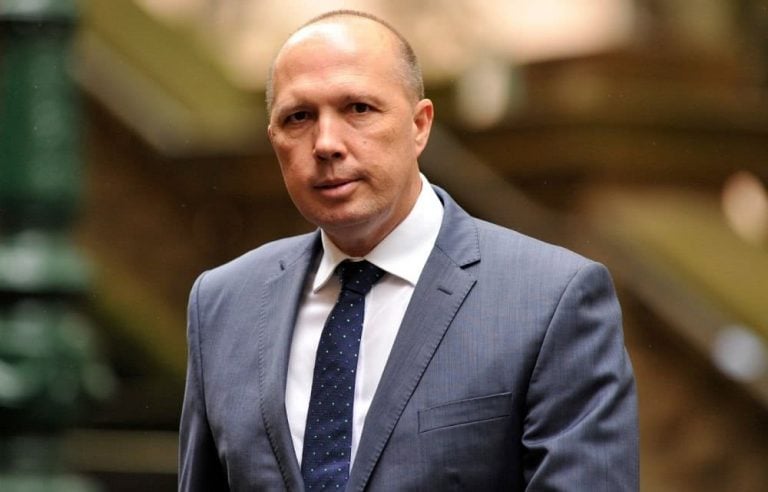Evil is a tricky word. It conjures up images so vivid as to be kitsch, prompting us to imagine evil men and women as diabolical dictators, all brutish figure with devil-red eyes. By the same token, it also encourages a kind of moral absolutism: people who are ‘evil’ seem incapable of being moderate, or of living ordinary lives. We struggle to imagine Hitler painting, or Stalin sitting down for dinner. We like our villains to be pantomime-esque in their depravity; larger than life, leering and lecherous.
Yet if history has taught us anything, it’s that the mechanics of oppression rely not on cartoon characters, but everyday men and women convinced what they are doing is ‘right’. Evil in its most practical, functional sense is not often enacted by charismatic figureheads: the minutiae of horror requires bland, faceless figures.
Peter Dutton is such a man. He is the poster child for those who will never be poster children – there is nothing about him that speaks of any great villainy. He is so lacking in commitment that even his callousness seems half-cocked: one of the most unfeeling remarks he has ever made slipped past his lips in the form of a crumpled dad joke, as he made a soggy quip about rising sea levels.
An atrocity that the population can’t actively see unfolding in front of them is never treated with any urgency – it’s not a threat, because its effects can only be read about second-hand
And yet, following his repeated attempts to underplay the current atrocities being enacted on Manus Island, Dutton has crossed the line from fool to threat. Dutton, like the rest of us, is well-aware of what is going on in the concentration camp over the seas: is well aware that innocent men and women like the journalist Behrouz Boochani are being arrested and beaten, their access to clean water cut, and their welfare directly threatened.
And that Dutton has become aware of such horrific acts and then felt more rather than less resolute in the need for a place like the Manus Island camp, represents his evolution into a figure full of the kind of everyday, average evil that enables great crimes to be ignored by the populace at large.
After all, ignorance has been the key to Australia’s asylum seeker policy for years now – offshore detention holds many perks for a government seeking to enforce tight border control, not least of all because ‘out of sight, out of mind’ can become an actual element of policy, rather than just a motto. An atrocity that the population can’t actively see unfolding in front of them is never treated with any urgency – it’s not a threat, because its effects can only be read about second-hand.
Love Music?
Get your daily dose of metal, rock, indie, pop, and everything else in between.
Dutton has long played a part in this enforced un-knowing. He is committed to moving the ‘Overton Window’, a phrase given to define the range of ideas that the voting public find rational. By positioning his asylum seeker policies as humane and offshore detention as fundamentally necessary, Dutton is making the very real crimes going on in Manus Island appear hysterical; the evidence to back it up unfounded.
Every time Dutton doubles down in the face of facts, he allows voters an easy option, and grants them the right to ignore one of the greatest human rights violations of our time. Before the recent bout of horror on Manus, it might be possible to say that we didn’t know how to help; now that we do, we can say politicians told us to ignore the truth. Peter Dutton is absolving us of responsibility, encouraging us to turn away from incidents of violence and mass repression that we otherwise could not turn away from.
Every time Dutton doubles down in the face of facts, he allows voters an easy option, and grants them the right to ignore one of the greatest human rights violations of our time.
Of course, he has been helped along the way by the sheer volume of atrocities that are going on in Manus Island. Reports from Boochani speak of sick men being denied medication; of the constant threat posed by the army and navy. The level of horror on Manus is therefore in and of itself hard to believe – anything that terrifying defies understanding. It requires concerted effort to put yourself into the shoes of someone whose experiences you have no equivalent for, and Dutton’s comments have been all about reducing effort.
After all, nudging the hard-to-believe into the territory of the unbelievable doesn’t take much work. If the reports coming out of Manus revealed information less abhorrent – or even less of it – then Dutton would have his job cut out for him. But he doesn’t. All Dutton has to do is argue that any attack on the conditions in Manus is a roundabout call of support for people smugglers. All he has to do is promote ignorance and encourage silence. All that he has to do is engineer a scenario in which “good men doing nothing” becomes the default position.
This is his callousness then, crumbled down into comments so understated they seem minor, defensible. And ultimately, more than anything, this is his great, average evil – he has made compassion seem unnatural.
He is, for that reason, a terrorist. His job as a spokesperson for a foul and inhumane refugee policy that is actively putting innocent people at risk requires him to lie, and to distort, and to misrepresent. He is not just another saggy bureaucrat in a bad suit and crowned with a receding hairline; he is a threat, one of the most pressing we as a nation currently face.
If you wish to take practical action and let Dutton know your thoughts about the current crisis on Manus, you can contact his office here: [email protected].


































